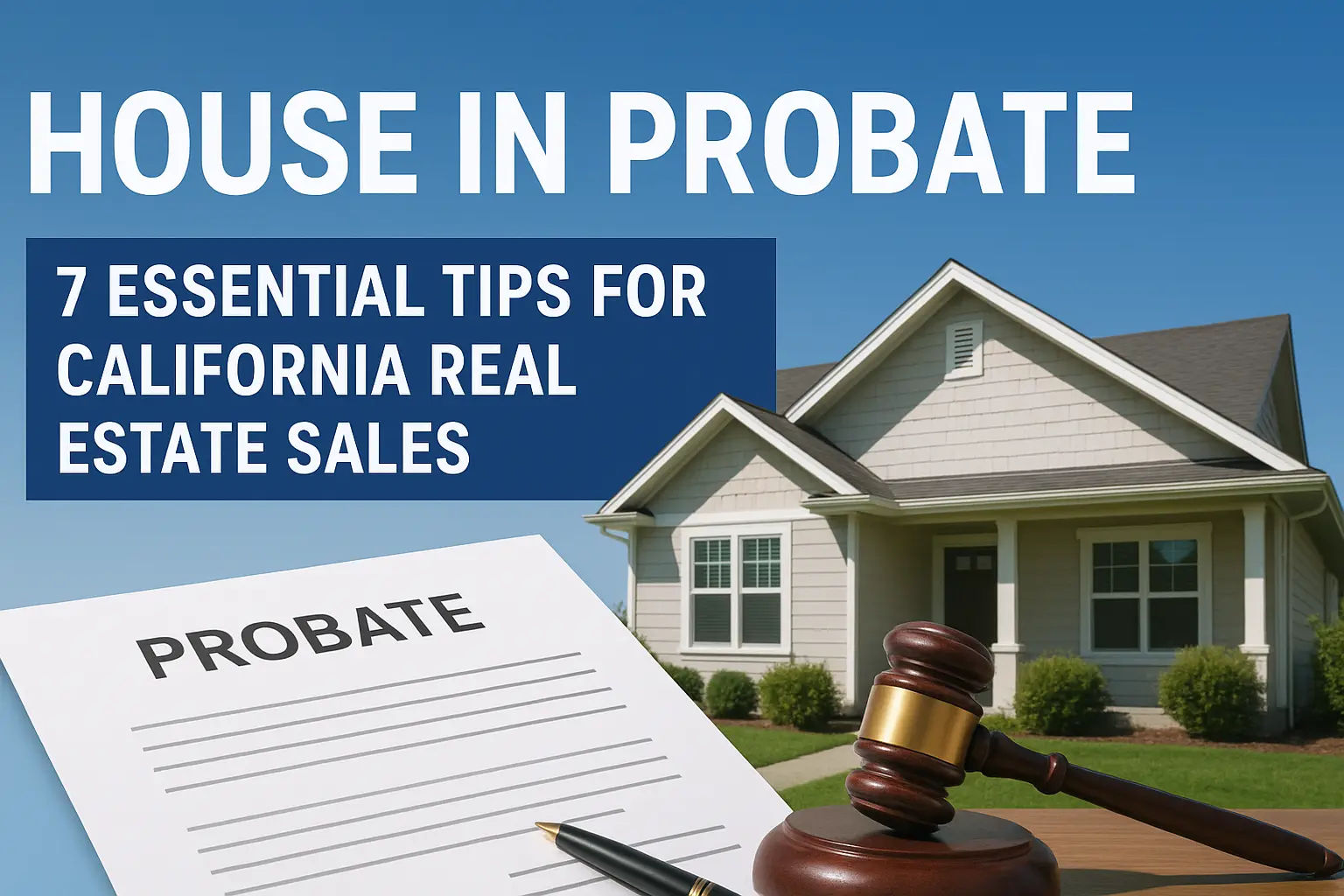
Table of Contents
When dealing with a house in probate, families often feel overwhelmed. Probate sales involve court supervision, legal procedures, and emotional stress — especially when the property belonged to a loved one. In California, probate real estate transactions follow strict rules, and mishandling the process can cause costly delays.
At Nicholas Realty, we’ve spent over 20 years helping families and executors manage probate real estate sales. To guide you, here are 7 essential tips for handling a house in probate in California smoothly and confidently.

1. Understand What a House in Probate Means
The first step in managing a house in probate is understanding what it means. Probate occurs when a homeowner passes away without placing their property in a trust. The probate court then oversees the transfer or sale of the property.
In California, this process can take several months or longer, depending on:
- Whether the decedent left a will.
- The complexity of the estate.
- The involvement of multiple heirs or creditors.
Key Point: A house in probate cannot be sold like a traditional property — the court must approve the process.
2. Hire a Probate Real Estate Specialist
Handling a house in probate without an expert is risky. A certified probate real estate specialist understands:
- The paperwork required by California probate courts.
- How to list the home properly.
- How to navigate overbidding during court confirmation.
Tip: Ask your agent if they have CPRES (Certified Probate Real Estate Specialist) training. Working with a specialist ensures the transaction meets legal requirements while protecting your interests.
3. Get a Probate Referee Appraisal
Before a house in probate can be sold, it must be valued by a probate referee. This neutral appraiser determines the fair market value, which then guides the minimum sale price.
Why it matters:
- The court usually requires that the home sell for at least 90% of the appraised value.
- Buyers and heirs gain confidence from an independent, court-appointed valuation.
Tip: Always review the referee’s appraisal carefully. If you believe the valuation is inaccurate, discuss it with your probate attorney.
4. Prepare the Property for Sale
A house in probate often needs repairs, cleaning, or staging before listing. While heirs may be eager to sell quickly, presenting the home well helps attract more buyers and higher offers.
Steps to consider:
- Decluttering and cleaning the home.
- Completing minor repairs.
- Using professional staging or photography.
Tip: Probate courts don’t require expensive upgrades, but even simple improvements can maximize value.
5. Learn How Court Confirmation Works
Many houses in probate require court confirmation before a sale is finalized. This process ensures fairness and transparency but can be confusing. Here’s how it typically works:
- An initial buyer submits an offer (with at least a 10% deposit).
- The probate court sets a hearing date.
- Other buyers may appear at the hearing to place overbids.
- The judge confirms the highest qualified bid.
Tip: If you’re selling, prepare heirs for the possibility of overbids. If you’re buying, know that you’ll need to meet court bidding rules.
6. Avoid Common Mistakes with a House in Probate
Families selling a house in probate often face unnecessary setbacks because of avoidable mistakes. The most common include:
- Failing to hire a probate-certified agent.
- Pricing the home too high or too low.
- Not understanding overbid procedures.
- Letting disputes between heirs delay the sale.
Tip: Work with professionals (agents, attorneys, referees) who specialize in probate. This ensures smoother transactions and fewer conflicts.
7. Partner with Experienced Probate Professionals
Successfully selling a house in probate requires teamwork. Your real estate agent, probate attorney, and probate referee must all work together to ensure compliance with California law.
Key Point: An experienced probate real estate agent bridges the gap between the court’s requirements and the family’s goals — ensuring the sale is both legal and beneficial.
FAQs About Handling a House in Probate
Q1: How long does it take to sell a house in probate in California?
Most sales take 6–12 months, depending on court scheduling and estate complexity.
Q2: Can heirs live in a house in probate during the process?
Yes, but this can complicate showings and delays. Discuss occupancy issues with your attorney.
Q3: Can a house in probate be sold without court confirmation?
Yes — in some cases, if the will grants full independent powers under the Independent Administration of Estates Act (IAEA).
Q4: What if heirs disagree about selling the house in probate?
The probate court will make the final decision to ensure fairness and protect the estate’s interests.
Q5: Do buyers need all cash for a house in probate?
Not always. Financing is possible, but cash buyers often have an edge in court confirmations.
Nicholas Realty: Your Guide to Probate Real Estate Sales
At Nicholas Realty, we know that managing a house in probate can be stressful. With more than two decades of probate real estate expertise, we guide families through every step of the process.
From valuation to court confirmation, our team ensures that your sale is handled with professionalism and compassion.
We also practice Giving While Living, supporting organizations like the Africa Wildlife Foundation and American Humane — because giving back to the community is part of who we are.
Need help with a probate, trust, or conservatorship sale? Call Nick Caudillo toll-free at 866.917.4001 or email nick@nrprobate.com for expert probate real estate services in Los Angeles, San Bernardino, and Riverside counties.
Conclusion & Key Takeaways
Handling a house in probate requires patience, knowledge, and the right support team. By understanding court procedures, avoiding common mistakes, and working with probate specialists, families can navigate this process smoothly.
Key Takeaways:
- A house in probate is court-supervised and requires special handling.
- Probate referees set property values.
- Court confirmation may involve competitive bidding.
- Professional guidance is critical for success.
Learn more by visiting our Tips for Buying a Probate Property. For official resources, check the California Courts Probate Self-Help Guide.

